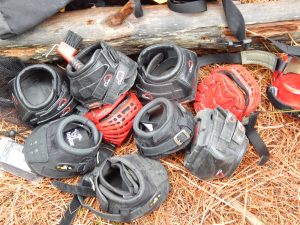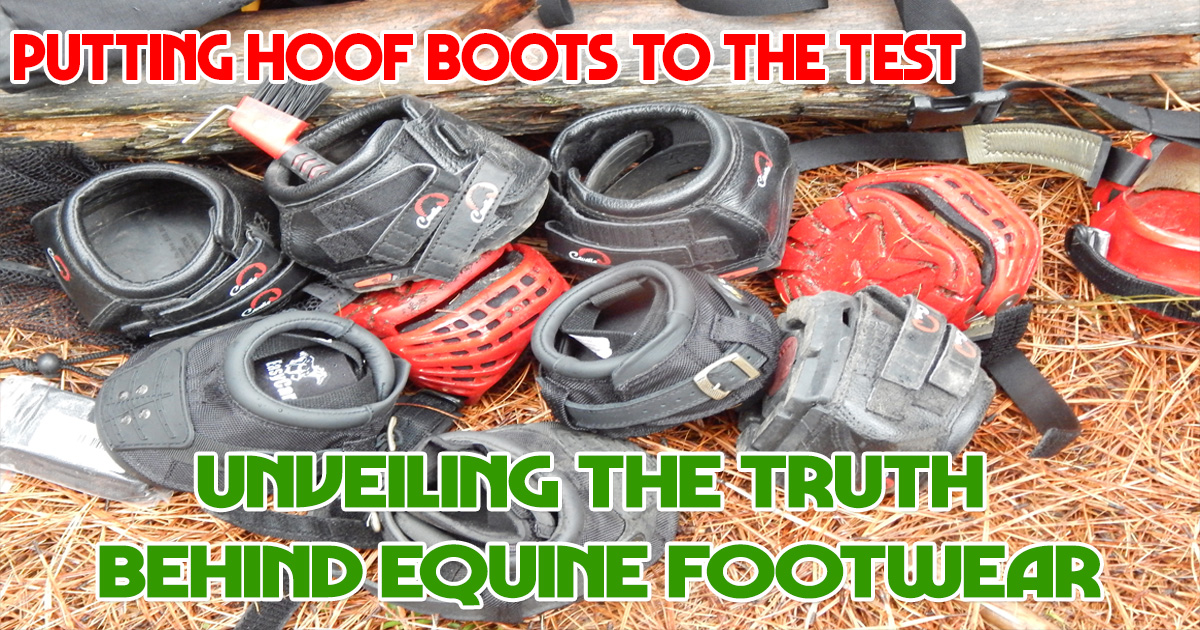Putting Hoof Boots to the Test: Unveiling the Truth behind Equine Footwear
Hoof boots? We’ve all heard of them, and it’s a love-or-hate relationship for most. I tried boots from 4 manufacturers a few years ago and promptly returned to traditional steel shoes.
Steel has worked for me for years. Other than a few sprung shoes, failures have been minimal at worst.
 So why try boots again? Technology is constantly improving, and hoof boots are no exception. Hoof boot manufacturers have added new models aimed at the trail riding and mule market and new materials that aim to resolve many of the issues I encountered when I last tried boots.
So why try boots again? Technology is constantly improving, and hoof boots are no exception. Hoof boot manufacturers have added new models aimed at the trail riding and mule market and new materials that aim to resolve many of the issues I encountered when I last tried boots.
I like that boots provide better traction in slick rock areas and preserve hoof structure and integrity by forgoing the nail holes left after each re-shoe. I also like the idea that boots should better accommodate the dynamic structure of the equine hoof. Unshod hooves are flexible, with give in response to their movement, and this flex influences the blood circulation in their hooves.
What does success with hoof boots look like?
Comfort is Key: The older I get, the more I understand the importance of comfort, not just for myself but also for my critters. Hoof boots allow the hooves to flex and move freely. This movement should result in less discomfort and soreness for our animals, making their rides more enjoyable. Since our animals don’t get to choose when or where we’re heading, their comfort should be a top priority.
Keeping Hooves Healthy: As experienced horse owners, we know the saying “no hoof, no horse.” Plastic hoof boots should reduce damage to the hoof walls, and they don’t require altering the hooves through nailing and should allow our horses to maintain their natural hoof integrity better.
Easy Application: I like easy. Some of the previous boots we tried were a PITA. Boots shouldn’t take an excessive amount of effort to put on and take off. With user-friendly features such as adjustable straps and closures, boots should be able to be easily adjusted quickly and removed. Hoof boots should save us time and effort and make our lives simpler.
Saving Some Money: From vet bills to equipment purchases, equine expenses rapidly add up. But plastic hoof boots offer a cost-effective alternative to traditional metal shoes. Not only are they durable and can withstand wear and tear, but they are also only used while riding, and this equals less frequent replacements and more money in our pockets. By opting for boots, we can save on long-term hoof care costs.
Non-Invasive Solution: At this stage in my life, I appreciate non-invasive options, and I’m beginning to feel the same for my mules. Preserving our horses’ natural hoof structure without nail holes is a reasonable expectation, and plastic hoof boots fit the bill perfectly.
A Perfect Fit: Our horses come in different shapes and sizes, just like us. The good news is that hoof boots are available in many more sizes than in previous years and have more features. This means a better chance of a good fit for our equine friends, ensuring maximum comfort and support. Proper fit is essential for hoof health and overall performance, and boots allow us to cater to our horses’ needs.
So, fellow equestrians, those are my thoughts on revisiting hoof boots. Their promises of comfort, hoof health benefits, easy application, and cost-effectiveness are a no-brainer for our trusted companions. It’s time to saddle up and embrace the modern solutions available. I’m hopeful that by choosing hoof boots, I can ensure the well-being and happiness of my animals for years to come. I’ll let you know how the experiment goes!
As always, for more information on trail riding and camping with horses www.TrailMeister.com. We’re also the world’s largest guide to horse trails and camps!


